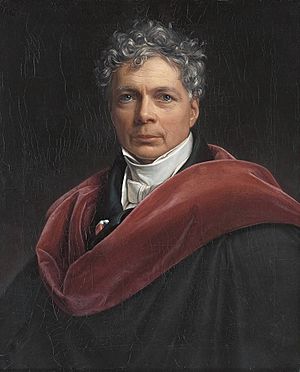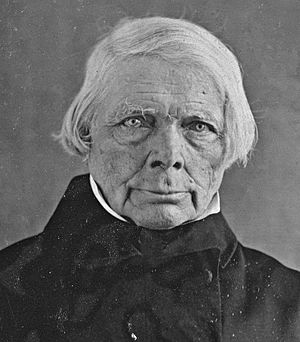Friedrich Wilhelm Joseph Schelling facts for kids
Quick facts for kids
Friedrich Wilhelm Joseph Schelling
|
|
|---|---|

Schelling by Joseph Karl Stieler, 1835
|
|
| Born | 27 January 1775 Leonberg, Württemberg, Holy Roman Empire
|
| Died | 20 August 1854 (aged 79) Bad Ragaz, Switzerland
|
| Education | Tübinger Stift, University of Tübingen (1790–1795: M.A., 1792; PhD, 1795) Leipzig University (1797; no degree) |
| Era | 19th-century philosophy |
| Region | Western philosophy |
| School | Continental philosophy German idealism Post-Kantian transcendental idealism (before 1800) Objective idealism Absolute idealism (after 1800) Naturphilosophie (a combination of transcendental realism and transcendental naturalism) Jena Romanticism Romanticism in science Correspondence theory of truth |
| Institutions | University of Jena University of Würzburg University of Erlangen University of Munich University of Berlin |
| Thesis | De Marcione Paulinarum epistolarum emendatore (On Marcion as emendator of the Pauline letters) (1795) |
| Doctoral advisors | Gottlob Christian Storr |
|
Main interests
|
Naturphilosophie, natural science, aesthetics, metaphysics, epistemology, Christian philosophy |
|
Notable ideas
|
List
Coining the term absolute idealism
System of Naturphilosophie Philosophy of chemistry Identitätsphilosophie (philosophy of identity) Positive Philosophie (positive philosophy) "Unconscious infinity" as the basic character of art |
|
Influenced
|
|
| Signature | |
Friedrich Wilhelm Joseph Schelling (born January 27, 1775 – died August 20, 1854) was an important German philosopher. He is known as a key figure in German idealism. This was a big movement in philosophy during the 18th and 19th centuries.
Schelling's ideas changed a lot during his life. Because of this, understanding his philosophy can be a bit tricky. He is often placed between two other famous philosophers: Johann Gottlieb Fichte, who was his teacher, and Georg Wilhelm Friedrich Hegel, who was his friend and later a rival.
For a long time, Schelling's work was not as well-known, especially in English-speaking countries. This was partly because Hegel's ideas became more popular. However, many modern philosophers are now looking at Schelling's work again.
Contents
Life of Friedrich Schelling
Early Years and Education
Friedrich Schelling was born in Leonberg, a town in what was then the Duchy of Württemberg. His father was a chaplain and a professor who studied languages from the Middle East.
When he was just 15, Schelling was allowed to join the Tübinger Stift. This was a special seminary (a school for religious studies) in Tübingen. There, he shared a room with Hegel and Friedrich Hölderlin, who both became his good friends.
Schelling first studied religious texts and ancient Greek philosophers. But soon, he became more interested in philosophy. He earned his master's degree in 1792 and his PhD in 1795. During this time, he also started studying the works of Kant and Fichte, who greatly influenced his early thinking.
In 1797, Schelling visited Leipzig and Dresden. He attended lectures on science, like chemistry and biology. He also met important writers and thinkers, including August Wilhelm Schlegel and Novalis.
Time in Jena
In 1798, when he was 23, Schelling became a professor at the University of Jena. This was a very exciting time for thinkers and artists, known as the Romanticism period.
Schelling became good friends with the famous writer Johann Wolfgang von Goethe. Goethe liked Schelling's ideas about nature, called Naturphilosophie, which had a poetic feel.
At first, Schelling was close to Fichte, but their ideas about nature started to differ. Fichte thought Schelling should focus more on his own ideas about how we know things. But Schelling, who was becoming a leader of the Romantic movement, found Fichte's ideas too cold and abstract.
Schelling also became very close to August Wilhelm Schlegel and his wife, Caroline. After a sad event where Caroline's daughter died, Schelling and Caroline grew even closer. They got married in 1803. This was the last time Schelling saw his old friend, the poet Friedrich Hölderlin, who was already struggling with mental illness.
During his time in Jena, Schelling also reconnected with Hegel. Schelling helped Hegel become a lecturer at Jena University. They even started a philosophy journal together. However, Schelling was very busy, and the journal soon became mostly Hegel's. Their philosophical ideas started to drift apart.
Moving to Würzburg and Munich
After Jena, Schelling moved to Würzburg in 1803 and became a professor there. During this time, his ideas continued to change. He also had a final break with his former friends, Fichte and Hegel.
In Würzburg, Schelling faced some opposition from other professors and the local government. So, in 1806, he moved to Munich. There, he worked as a state official and for the Bavarian Academy of Sciences and Humanities.
In 1806, Schelling published a book that openly criticized Fichte. A year later, Hegel sent Schelling his new book, Phaenomenologie des Geistes (Phenomenology of the Spirit). Schelling was surprised to find criticisms of his own ideas in it. He asked Hegel to explain, but Hegel never replied. From then on, Schelling and Hegel often criticized each other's work.
Later Years in Munich and Berlin
Schelling stayed in Munich for a long time, from 1806 to 1841. During this period, he didn't publish as much. Many believe this was because Hegel's philosophical system was so dominant.
In 1809, his wife Caroline died. Three years later, he married Pauline Gotter, who became a loyal companion.
After Hegel's death in 1831, Schelling started to speak out more about his differences with Hegel's ideas. He believed that his own philosophy offered something more positive, especially when it came to religion.
In 1841, Schelling was invited to Berlin, which was a center for Hegelian philosophy. He was asked to give lectures at the university. Many famous people attended his lectures, including the philosopher Søren Kierkegaard and the revolutionary Mikhail Bakunin. Some found his lectures interesting, while others, like Kierkegaard, were not impressed.
Unfortunately, someone secretly published his lectures without his permission. Schelling couldn't stop this legally, so he stopped giving public lectures in 1845.
Schelling's Writings

Schelling wrote many books and essays throughout his life. His early works often explored the ideas of Fichte. For example, in 1794, he published Ueber die Möglichkeit einer Form der Philosophie überhaupt (On the Possibility of a Form of Philosophy in General). This book helped him gain a reputation among philosophers.
In 1795, he wrote Vom Ich als Prinzip der Philosophie (On the I as Principle of Philosophy). This work showed his interest in combining Fichte's ideas with those of another philosopher, Spinoza. He also studied science and medicine.
His interest in nature led him to write Ideen zu einer Philosophie der Natur (Ideas Concerning a Philosophy of Nature, 1797) and Von der Weltseele (On the World-Soul, 1798). In these books, he explored how the ideal (our thoughts and ideas) comes from the real (nature). He saw nature as having different stages, from basic forces like light and magnetism to living organisms.
In 1800, Schelling published System des transcendentalen Idealismus (System of Transcendental Idealism). In this book, he said that understanding nature and understanding our own minds were two parts of the same philosophical journey.
One of his important later works is Philosophische Untersuchungen über das Wesen der menschlichen Freiheit (Philosophical Inquiries into the Essence of Human Freedom, 1809). In this book, he explored ideas about human freedom and the problem of evil. He believed that freedom is the ability to choose between good and evil.
Schelling also planned a big work called Weltalter ("The Ages of the World"). It was meant to describe the past, present, and future of the world. However, he only ever wrote parts of the first section, and it was never fully published during his lifetime.
After his death, his sons published his Berlin lectures. These included Introduction to the Philosophy of Mythology and Philosophy of Revelation. These works showed his later ideas about mythology and religion.
Schelling's Influence
Schelling's ideas have had a lasting impact, even if his reputation has changed over time. Some scholars see him as a brilliant thinker whose ideas kept evolving. Others argue that his philosophy always focused on core themes like human freedom, the absolute (the ultimate reality), and the connection between mind and nature.
His work influenced the English poet Samuel Taylor Coleridge, who brought some of Schelling's ideas into English literature. For example, Coleridge introduced Schelling's concept of the unconscious mind. Some even see Schelling's System of Transcendental Idealism as an early hint of Sigmund Freud's ideas about dreams.
For a while, Schelling was almost forgotten, even in Germany. But in the 1950s, interest in his work grew again. Philosophers like Martin Heidegger found important ideas in Schelling's work on human freedom.
Today, Schelling's Naturphilosophie is being looked at again, especially with growing interest in environmental issues. His idea of connecting nature and intellectual life in one system is seen as very relevant. His influence on German art and literature, especially the Romantic movement, is also still studied.
Modern thinkers like Slavoj Žižek have used Schelling's philosophy in their own work. Schelling is considered one of the philosophers who had a very broad impact on Western thought.
Famous Sayings
- "Nature is visible spirit, spirit is invisible nature." (Ideas, "Introduction")
- "History as a whole is a progressive, gradually self-disclosing revelation of the Absolute." (System of Transcendental Idealism, 1800)
- "Has creation a final goal? And if so, why was it not reached at once? Why was the consummation not realized from the beginning? To these questions there is but one answer: Because God is Life, and not merely Being." (Philosophical Inquiries into the Nature of Human Freedom, 1809)
- "Only he who has tasted freedom can feel the desire to make over everything in its image, to spread it throughout the whole universe." (Philosophical Inquiries into the Nature of Human Freedom, 1809)
See also
 In Spanish: Friedrich Schelling para niños
In Spanish: Friedrich Schelling para niños
- History of aesthetics before the 20th century
- Nondualism
- Perennial philosophy
 | Janet Taylor Pickett |
 | Synthia Saint James |
 | Howardena Pindell |
 | Faith Ringgold |

